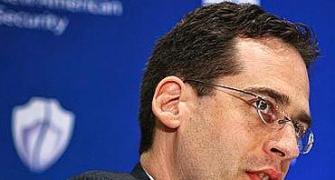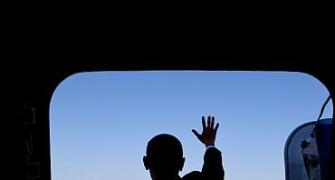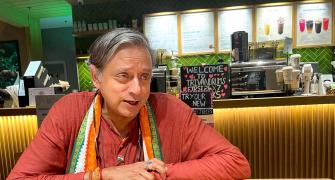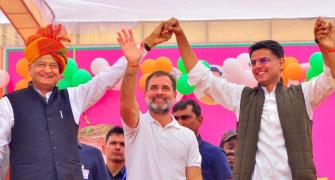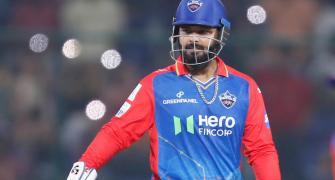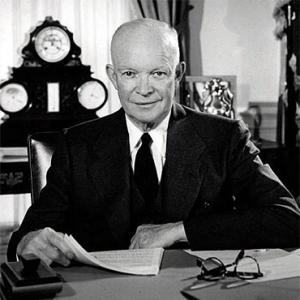 'Only then can we play our role in balancing China and deal with the menace of global terrorism. If minimal concessions are not forthcoming, then the Indo-US strategic partnership is as good as dead,' argues Colonel Anil A Athale (retd).
'Only then can we play our role in balancing China and deal with the menace of global terrorism. If minimal concessions are not forthcoming, then the Indo-US strategic partnership is as good as dead,' argues Colonel Anil A Athale (retd).
It is tempting to compare the presidential visits of Jimmy Carter and Barack Obama to India. Like President Obama, Carter followed eight years of Republican Party rule.
President Obama matches Carter in individual achievements and intellectual ability. Carter was the first commander of a nuclear submarine and the first to go under the North Pole. After military service he made millions of dollars as a successful peanut farmer! He even made a chair with his own hands without using a single nail.
But Carter turned out to be a 'one-term wonder' and was trounced by a populist Ronald Reagan. Like Carter, Obama came to the helm of affairs with then President George W Bush's popularity plummeting to depths in his last few years.
Like Carter, Obama came in with much hype and hope. But as the results of the Congressional elections show, Obama is seen to have failed to deliver. There is a real danger that Obama, like Carter may turn out to be one-term President.
Carter was the third US President to visit India in January 1978. During his three-day stay in the capital, he was caught by microphones telling his aides that a 'cold and blunt message' should be delivered to the Indians over its nuclear ambitions.
India had the first-ever non-Congress government led by Morarji Desai, and there was expectation in the American camp that he would reverse India's pro-Soviet foreign policy.
In the event the visit did nothing of the sort with Desai pointedly saying that Indira Gandhi's defeat in the 1977 general election was due to discredited domestic policy and not foreign policy.
This was his response when the Americans publicly hoped that he would 'change' the 'discredited policies of the Indira Gandhi regime'.
Carter's visit was followed by a long winter in Indo-US relations that lasted 22 years.
In March 2000, Bill Clinton became the fourth US President to visit India. Much water has flowed down the Ganga since then and during the eight years of George W Bush's regime Indo-US relations scaled new heights, culminating in the nuclear deal and emerging strategic partnership.
On the surface it may seem outrageous to compare the Carter and Obama visits, but given a very different Obama approach to issues like global terrorism, Pakistan and Chinese assertiveness, as opposed to his predecessor, this possibility cannot be ruled out.
Understanding the American presidency
This author has been interacting with the Americans for last over two decades. It is essential to therefore disabuse Indians of some pet notions on America and its government.
The American presidency is almost 'monarchial' in some aspects. The pomp and show that is associated with it is very close to being 'royal' in everything but the title.
While the US fought against England and got its freedom, the Magna Carta (dating back to 1215) finds a pride of place in the American National Museum in Washington, DC.
Subconsciously, the Americans see themselves as the inheritors of British democracy. Since they wanted democracy and also loved monarchy, they instituted a system of 'elected monarchs'. The fuss Americans make over their First Family and the way the whole country took to jogging (during Carter's time) or riding (during Reagan's) is instructive.
Even the national preferences for pets (whether cats or dogs) closely follows the incumbent presidential preference.
This is not to say that the American president has absolute powers, far from it since the US has institutionalised separation of powers -- between the two Houses of Congress and the President.
The second fact about the US is that it is a deeply religious country. Even the so- called liberals like Obama have to invoke their faith at a drop of a hat. This is a far cry from the Indian secularists who have great allergy to the word specially as it concerns the majority.
Two quotes by French political scientist Alexis de Tocqueville are worth repeating here:
'The Americans combine the notions of religion and liberty so intimately in their minds, that it is impossible to make them conceive of one without the other.'
'The surface of American society is covered with a layer of democratic paint, but from time to time one can see the old aristocratic colours breaking through.'
Another point to remember is that the US follows 'ideology of affluence' and the business of America in the world is business.
No American diplomacy is divorced from its economic content.
Again to quote Tocqueville,
'As one digs deeper into the national character of the Americans, one sees that they have sought the value of everything in this world only in the answer to this single question: How much money will it bring in?'
'In no other country in the world is the love of property keener or more alert than in the United States, and nowhere else does the majority display less inclination toward doctrines which in any way threaten the way property is owned.'
The third point about the US is its conformism. The media is free and yet on issues of perceived national interest there is no freedom to air differences.
Notice how the whole country fell behind President George W Bush in the aftermath of the 9/11 terror attacks.
President Obama's uniqueness
President Obama idolises President John F Kennedy and following in his footsteps has one of the best qualified cabinets in American history. He even has a Nobel Laureate dealing with the environment.
Many talented Indians have found a place in his team. But unlike Kennedy, who was a self confessed 'pragmatic' liberal (many called him Camelot) Obama seems to have bitten more than he can chew.
In any case, despite its 'monarchial' veneer, the US foreign policy establishment is extremely strong and difficult to change in a hurry. Obama seems to be finding this now and has led to some U-turns and dilution in his campaign rhetoric.
Obama, as the first-ever 'man of colour' to reach office, is conscious of the problems of national minorities and has his natural sympathies in that direction. It is this tendency of his that can cause problems for India.
For in India we have a unique situation of the minorities who are very conscious of their history of having ruled over the majority and clamour for not equal rights but 'special rights' and separatism.
Unfortunately, the politically correct notions of Indians have resulted in failure to project these correctly to the world at large.
In his initial year, Obama seemed to have charted a course of action that emphasised 'accommodation' in dealing with the twin problems of Islamist terror and a rising and assertive China.
Like Carter, he may well come to grief unless the two antagonists respond to his overtures. So far at least there seems no sign of that happening.
What are the likely gains from this visit?
One of the reasons for the failure (from the Indian point of view) of the Carter visit in 1978 was that India was a 'peripheral' interest at that time. In 2010, India is very much at the centre of US core concerns, both on terrorism and a rising China. It makes the US president that much more predictable.
The renowned economist John Kenneth Galbraith had told this author that the US State Department was the hardest to change -- its attitudes, programmes and cliches!
In the past it worked against Indian interests, but this time around it would work in our favour since over the last 10 years a consensus in favour of India has built up in the US bureaucracy.
The policy paper by Robert Komer (April 7, 1961) that consulted China specialists charted out a 'middle road' approach to China. This suggested economic engagement and military containment. Towards that end it was suggested that the US to strengthen India and Japan.
But like many disastrous turns (like creating the jihadis) this policy was given a go by in the Reagan era. It was only towards the end of 2000 that the US began to adjust its polices to the post Cold War world.
As an aside, one would like to share with the readers is that ten years ago when President Clinton visited India, many of us tried our level best to break that Indo-Pak hyphenated relationship and prevent him from visiting Pakistan, but the US president did go.
That President Obama has de-linked his India visit from Pakistan is a victory of sorts for Indian diplomacy.
For public consumption, Obama may well endorse India for a permanent seat in the United Nations Security Council. The US loses nothing by this gesture as that will remain illusive till China agrees.
But the acid test in the opinion of most Indians concerned with issues of security and peace will be whether the visit gets us into the Nuclear Suppliers Group and the Wassenaar Arrangement (the multilateral export control regime), ending the technological apartheid we have faced since the first nuclear test in May 1974.
In 1982, when the Reagan administration denied super computer technology to India, an Indian diplomat had remarked that the US had supplied the same to China even without any restrictions. The reply from America was that in case of China there was no such need. Implying that since the US and Chinese strategic interests coincided there was no need for any safeguards.
If Indian and American strategic interests similarly coincide (and this author has no doubt about it) then the US must unshackle India. Only then can we play our role in balancing China and deal with the menace of global terrorism.
If these minimal concessions are not forthcoming, then the Indo-US strategic partnership is as good as dead.
One word of caution to Obama: 'Beware of hidden microphones!' For the sake of future relations between our two countries one wishes that Obama does not become Jimmy Carter version 2.0.
Colonel Anil A Athale (retd) is the co-ordinator of the Pune-based think-tank Initiative for Peace and Disarmament.

